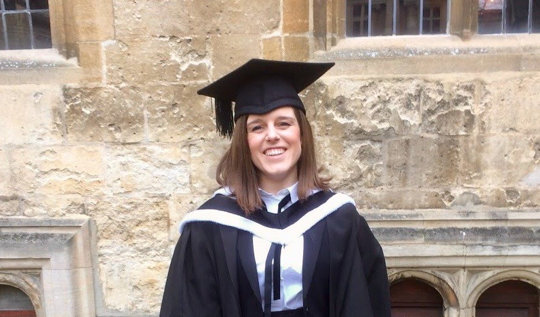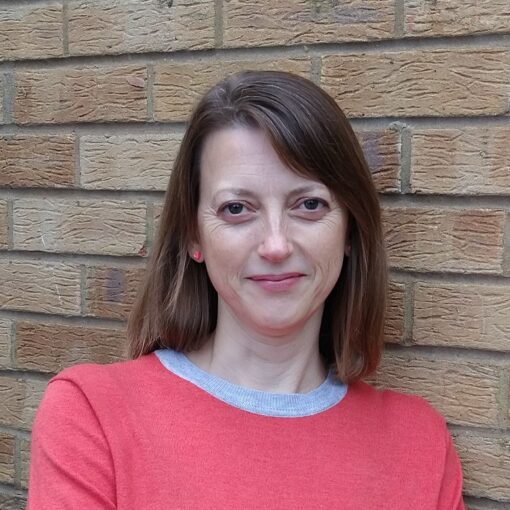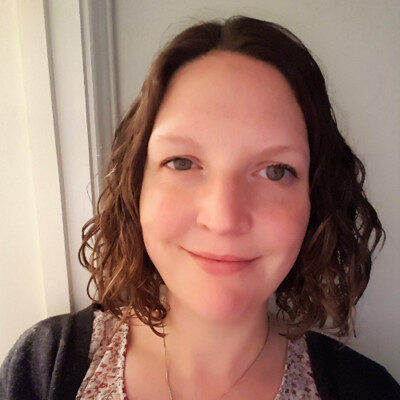DPhil, University of Oxford (2017)
| Senior Portfolio Manager, Capability and Innovation (Skills and Careers) | |
|---|---|
| UKRI-BBSRC | |
Year entered into a non-academic position: 2017
Job highlight:: working with very senior and brilliant bioscientists without having to step foot into a lab!
My research training set me up to… work independently and have a sense of self-motivation
Left academia after: PhD
What’s your background?
My background is in Developmental Biology. I’ve always been fascinated by the way in which an entire human can develop from a single cell. My PhD looked at the development of testes in mice to better understand a group of rare disorders called Differences of Sex Development (DSDs).
Why did you move away from academia?
The main factor for me was the uncertainty of an academic career. I’ve always wanted a family and felt that the instability of an early career researcher’s career (short-term postdoc contracts followed by the possibility of never making it to a tenure-track position) was not compatible with the way I imagined living my life!
This has been proven to me in the last year where we have been able to buy our first house, get married, get a dog and get pregnant, all in the same year without having to worry about whether I might have a job in a year’s time, or whether we might have to move across the country for a too-good-to-refuse job in a scientific specific field.
I also don’t think that the type of work a researcher does suited me, either. My personality type means I like to think about the big picture and don’t enjoy working on the details. Job in policy and strategy seem to have fulfilled this need for me.
Finally, I felt that I could have a bigger impact on the wider research and innovation landscape by working outside of academia. My work now revolves around managing the fellowship portfolio for BBSRC and ensuring that we are supporting our fellows in the best way possible. I feel I can have a bigger influence over the culture of research in roles such as these, as opposed to working as a researcher.
Is there anything you miss about academia?
I miss the excitement that comes from discovering something new, but there are lots and lots of things I don’t miss…
How did you get this job? Did you face any challenges when considering a move away from academia or applying for the role?
I have had several non-academic roles since finishing my PhD. I think the most crucial step, however, was getting the initial bit of policy experience during my Royal Society Internship. I remember really struggling to find this initial opportunity though. I thought I had an impressive CV but didn’t even get to interview in most cases. In total I applied to between 10 and 15 policy type roles, got two interviews and one offer (which I only really got because someone else dropped out!). After this, many more doors were opened.
Another challenge was not really understanding that there are many similar roles related to policy that you can fairly easily move between. For example, if you are working for a funder, it is often straight forward to move from a grant administration role to the policy or strategy side of the office. Sometimes taking a more administrative role initially helps you get a foot in the door if you are lacking experience outside of academic. In BBSRC, there are many opportunities to work with other groups across the office and on projects that are outside of your role, to help you get the experience required to change roles.
If I did it again, I would search for and apply for a much wider range of jobs, including portfolio managers, public engagement jobs, strategy roles and others, not just roles with the word “policy” in the title.
What motivated you to/why did you choose the sector you transitioned into?
I really wanted to make sure I was still exposed to cutting edge research but wanted to be able to take a step back and look at the bigger picture. The narrowness of a PhD was something that really bothered me. I never really had time to explore beyond my field or get exposed to different types of science. In the roles I have done since, however, I am exposed to a wide range of different research. I don’t have a huge amount of time to understand it in depth, but the breadth is good enough for me!
Did you think you had the skills required for your current position before you started? Were you right?
I think I had many of the skills required but I definitely needed to further develop a number of them. I also needed to demonstrate some of these transferable skills within an office, rather than lab, setting i.e. demonstrate that I could “transfer” them to a new working environment.
How did your PhD prepare you for your current job? For example, what were the transferable skills that you developed during your PhD that are most relevant to your current job?
Communication skills. Analytical skills. Understanding a research environment. How to talk to researchers.
Did you have any preconceptions about your sector that proved to be wrong?
To be completely honest, I’m not sure what I expected when I first started working in the sector. What I can say is that the roles I have worked in, despite being superficially similar, have been quite varied. For example, some jobs have been heavily admin based, whereas others I have had more freedom to complete projects with more creativity.
Can you describe a typical week in your job?
I wouldn’t really say that there is a typical week in my job – it changes a lot depending on what stage of the grant cycle we are at. Furthermore, since starting this role, I have been carrying out a comprehensive review of our fellowship schemes, an activity which only really happens for major funding programmes every few years.
At the time of writing, my week is a mixture of dealing with queries and documentation to do with the current fellowship calls, which are currently open for submissions. We are preparing for applications to be sent out for review, and for the sift meeting and interviews. As I am writing this during lockdown, we are also tackling a significant number of queries related to the pandemic.
Simultaneously, I am in the final stages of drafting the written report which summarises the findings of the review of fellowships. This includes presenting options for different ways forward for our fellowship programmes to BBSRC’s council members.
What is the workplace culture like? Please include comments on work-life balance, flexibility, remote working?
Although sadly not the case in all organisations I have worked in, the culture in BBSRC is brilliant. We have a flexi-time system which allows us to work a schedule that suits us, and even before the pandemic, had lots of flexibility in terms of working from home. Lots of my team members also work part-time or condensed hours.
It somewhat varies between line managers, but in my experience most managers actively encourage their staff to maintain a good work-life balance and will monitor to ensure you are not working significantly over your hours. It really shocked me when my line manager at the Royal Society would tell me to go home after I had worked my hours every day! Generally, the culture is friendly and open. In my wider team, we have a lot of laughs and chit chat, and lots of cake of course! I would say it’s the nicest place I have worked!
Do people with a PhD frequently get hired in the company/sector?
Yes, absolutely. The majority of people who work in my team have at least a PhD. Some even have significant postdoc experience too.
What are your favourite parts of your job?
I enjoy the aspects of the job which allow me to use a little creativity. For example, as part of the review I designed and ran a workshop where participants were asked to come up with different ideas for alternative fellowship schemes and then assess these against BBSRC’s current offering.
I also really enjoy attending conferences and meetings for Early Career Researchers to explain our fellowship programmes and to answer questions on them. Often, this is part of a conference or wider meeting which gives me a chance to see some of the research too and meet some of the talented people who are carrying it out. Communicating with the scientific community was an aspect of my academic life I really enjoyed, but I rarely had the opportunity to present my work.
What are your reflections on your career path?
On reflection, I’m not sure my aim was ever to remain in academia! I think that, like a lot of people, I did a PhD to allow me to postpone having to get a real job for a while!! However, I don’t regret it as I don’t think I could do my job as well as I can without having had a little insight into how academia works. I also don’t think I would appreciate the kind of environment I can now work in as much either.
Do you have any advice for current graduate students and postdocs considering a career outside of academia?
I would try and explore your options and get some experience (even if it’s just a week or two of shadowing) as early as possible. This will not only help you decide what is best for you but will also put you at an advantage over those with absolutely no experience.
Try and demonstrate your skills, wherever you can, outside of a lab setting. Do some outreach, get involved in some of your institution’s politics, sit on panels or boards, take part in societies. Most people applying for these kinds of jobs will have a PhD – you need something that will help you stand out in a crowd.
What do you know now that you wish you’d known when exploring a transition?
I wish I had known that these kinds of jobs existed outside of London! UKRI (the umbrella organisation which sits over BBSRC, MRC etc.) is mainly based in Swindon with Research England in Bristol. These jobs are also significantly less competitive than some jobs in London, so can be a good for that initial experience, even if the aim is to work in London later in your career. There are also jobs in Universities all over the UK which do something similar. I was completely unaware this was a possibility.
Can you recommend any relevant resources, organisations or events that might help somebody new to the sector find out more about it?
I think you can only really understand the sector by being immersed in it for some time. Therefore, instead of reading or researching, I would contact as many places as possible to see whether you could shadow someone for a week or two. Most places I have worked have seemed fairly flexible about arranging these kinds of opportunities. Somewhere like UKRI is large enough that it should be able to accommodate you and you will have an opportunity to work with people from across a wide range of roles. If not UKRI, try contacting some of the membership societies like the Royal Society of Biology or the Academy of Medical Sciences.
.
 BBSRC is part of UK Research and Innovation, a new body which works in partnership with universities, research organisations, businesses, charities, and government to create the best possible environment for research and innovation to flourish. We aim to maximise the contribution of each of our component parts, working individually and collectively. We work with our many partners to benefit everyone through knowledge, talent and ideas. We invested £498 million in world-class bioscience in 2017-18. We support around 1,600 scientists and 2,000 research students in universities and institutes across the UK. [Extract from https://bbsrc.ukri.org/about/]
BBSRC is part of UK Research and Innovation, a new body which works in partnership with universities, research organisations, businesses, charities, and government to create the best possible environment for research and innovation to flourish. We aim to maximise the contribution of each of our component parts, working individually and collectively. We work with our many partners to benefit everyone through knowledge, talent and ideas. We invested £498 million in world-class bioscience in 2017-18. We support around 1,600 scientists and 2,000 research students in universities and institutes across the UK. [Extract from https://bbsrc.ukri.org/about/]





